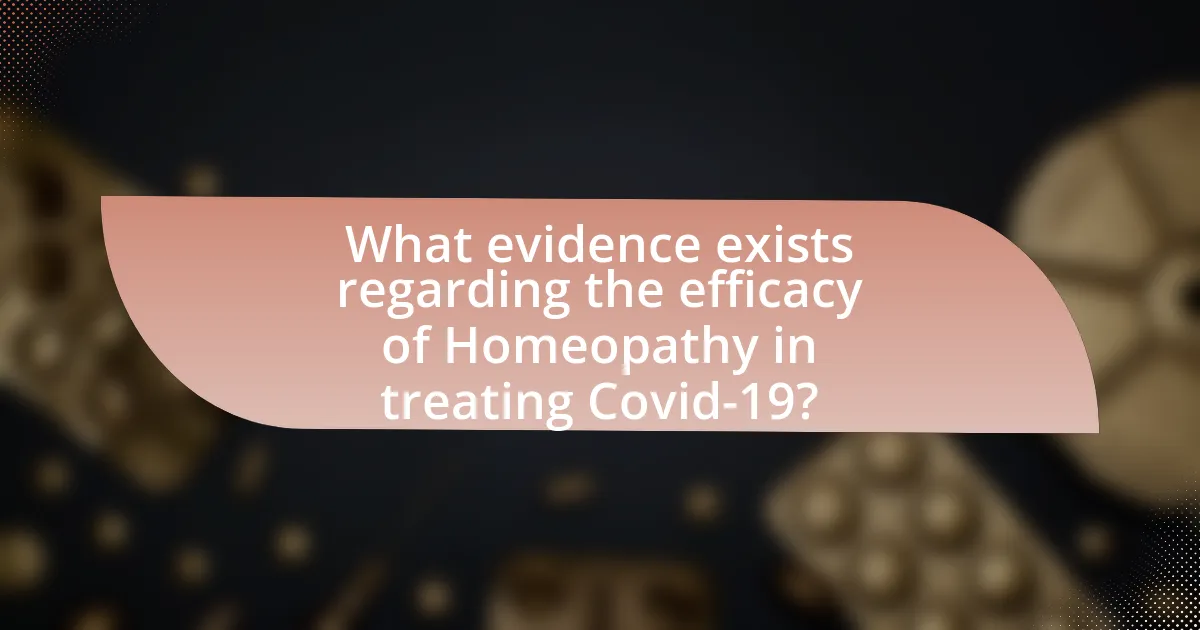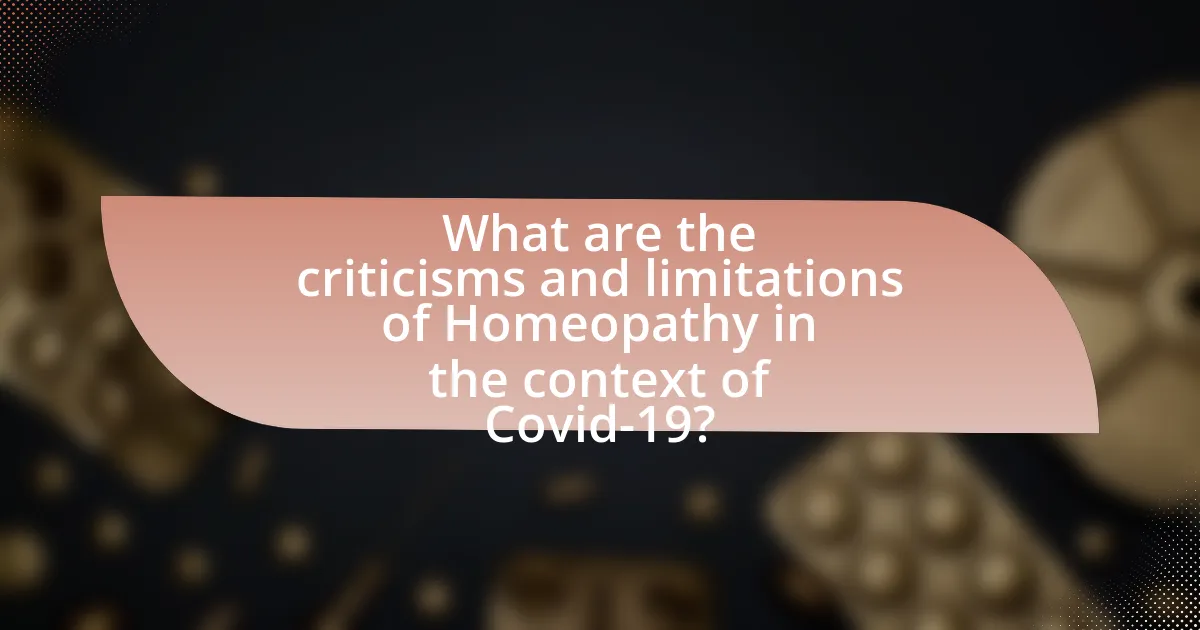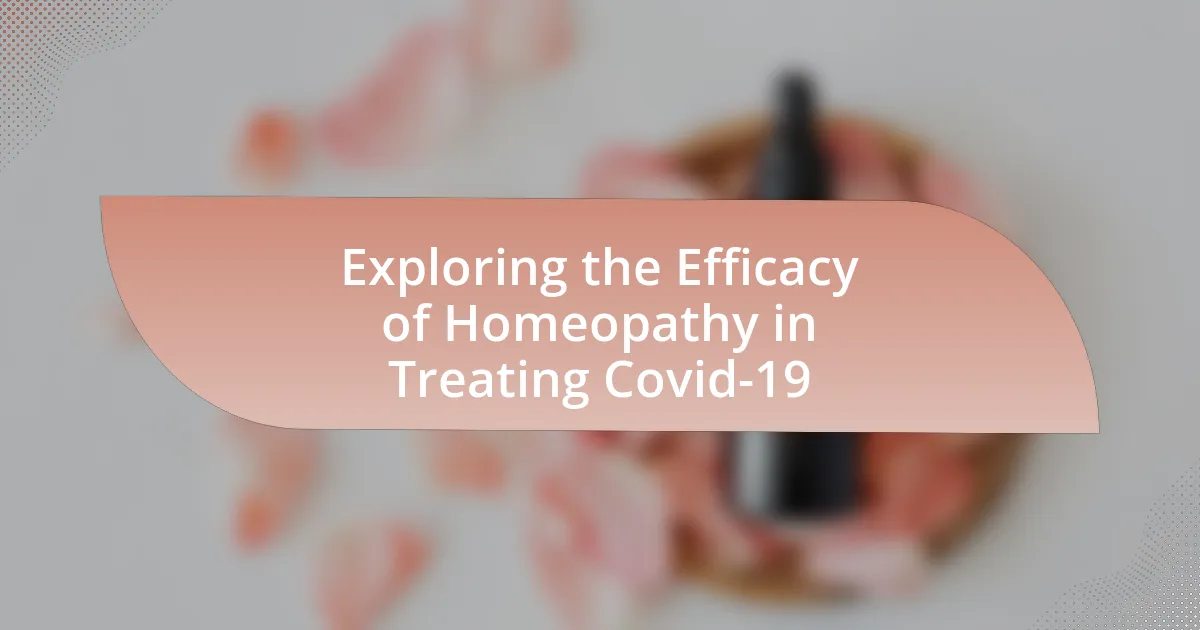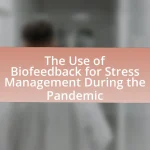Homeopathy is an alternative medicine system that operates on the principle of treating “like with like,” utilizing highly diluted substances to stimulate the body’s self-healing mechanisms. The relevance of homeopathy in the context of Covid-19 has sparked considerable debate, with proponents claiming potential benefits for immune support and symptom relief, despite limited scientific evidence. This article examines the differences between homeopathy and conventional medicine, the historical context of homeopathy during pandemics, and the existing research on its efficacy in treating Covid-19. It also addresses criticisms of homeopathy, the potential risks of relying solely on it for Covid-19 treatment, and how it may be integrated with conventional medical approaches.

What is Homeopathy and its Relevance to Covid-19?
Homeopathy is a system of alternative medicine based on the principle of treating “like with like,” where substances that cause symptoms in healthy individuals are used in diluted forms to treat similar symptoms in sick individuals. Its relevance to Covid-19 has been a subject of debate, as some proponents claim that homeopathic remedies can support the immune system and alleviate symptoms, although there is limited scientific evidence to substantiate these claims. Research, such as a systematic review published in the journal “Homeopathy” in 2020, indicates that while some studies suggest potential benefits, the overall efficacy of homeopathy in treating Covid-19 remains unproven and controversial within the medical community.
How does Homeopathy differ from conventional medicine?
Homeopathy differs from conventional medicine primarily in its approach to treatment; homeopathy utilizes highly diluted substances to stimulate the body’s self-healing mechanisms, while conventional medicine typically employs pharmacological agents to directly target symptoms or pathogens. Homeopathy is based on the principle of “like cures like,” meaning that a substance causing symptoms in a healthy person can be used to treat similar symptoms in a sick person. In contrast, conventional medicine relies on evidence-based practices and clinical trials to determine the efficacy of treatments. For instance, a systematic review published in the “British Journal of Clinical Pharmacology” found that homeopathic remedies often lack robust scientific support compared to conventional treatments, which are rigorously tested for safety and effectiveness.
What principles underpin Homeopathic treatment?
Homeopathic treatment is underpinned by three main principles: the Law of Similars, the Law of Infinitesimals, and the principle of individualized treatment. The Law of Similars posits that a substance causing symptoms in a healthy person can be used to treat similar symptoms in a sick person. The Law of Infinitesimals states that the more a substance is diluted, the more potent it becomes, which is contrary to conventional pharmacology. Individualized treatment emphasizes tailoring remedies to the unique symptoms and overall constitution of the patient, rather than a one-size-fits-all approach. These principles are foundational to homeopathy and guide practitioners in their treatment methodologies.
How is Homeopathy traditionally applied in infectious diseases?
Homeopathy is traditionally applied in infectious diseases through the use of highly diluted substances that aim to stimulate the body’s self-healing processes. Practitioners select remedies based on the individual’s specific symptoms and overall constitution rather than the disease itself, following the principle of “like cures like.” Historical evidence shows that homeopathic treatments were utilized during epidemics, such as the cholera outbreak in the 19th century, where homeopathic practitioners reported higher survival rates compared to conventional treatments. This approach emphasizes individualized care and aims to enhance the immune response, which is particularly relevant in managing infectious diseases.
What is the historical context of Homeopathy in pandemics?
Homeopathy has been utilized during pandemics since its inception in the late 18th century, particularly during outbreaks such as cholera, influenza, and more recently, COVID-19. Historical records indicate that homeopathic treatments were employed effectively during the 1918 influenza pandemic, where homeopaths reported lower mortality rates among treated patients compared to those receiving conventional care. For instance, a study published in the American Journal of Homeopathic Medicine in 1919 highlighted that homeopathic hospitals had a mortality rate of approximately 1% compared to 30% in conventional hospitals during the same period. This historical context illustrates the role of homeopathy in addressing public health crises, showcasing its application and perceived efficacy in managing infectious diseases.
How has Homeopathy been utilized in past epidemics?
Homeopathy has been utilized in past epidemics as a complementary treatment option, particularly during the cholera outbreaks in the 19th century and the influenza pandemic of 1918. During the cholera epidemics, homeopathic practitioners reported significantly lower mortality rates among patients treated with homeopathic remedies compared to those receiving conventional treatments. For instance, a study conducted by Dr. J. H. Clarke in 1895 indicated that homeopathic treatment resulted in a mortality rate of around 10%, while conventional methods had rates exceeding 50%. Similarly, during the 1918 influenza pandemic, homeopathy was employed widely, with reports suggesting that homeopathic patients experienced milder symptoms and lower mortality rates. The use of homeopathy in these historical contexts demonstrates its role as an alternative approach during health crises.
What lessons can be learned from historical applications of Homeopathy?
Historical applications of Homeopathy reveal that its efficacy often relies on the principles of individualized treatment and the placebo effect. For instance, during the cholera outbreaks in the 19th century, homeopathic practitioners reported significantly lower mortality rates compared to conventional medicine, with some studies indicating a mortality rate of around 10% for homeopathy versus 50% for allopathic treatments. This suggests that personalized care and patient belief in treatment can influence health outcomes. Additionally, the historical reliance on minimal dosing in homeopathy raises questions about the importance of dosage and its psychological impact on patients, which can be relevant in contemporary discussions about treatment approaches, including for conditions like Covid-19.

What evidence exists regarding the efficacy of Homeopathy in treating Covid-19?
Current evidence does not support the efficacy of homeopathy in treating Covid-19. Systematic reviews and clinical trials, such as the one published in the “British Journal of Clinical Pharmacology” in 2020, found no significant benefits of homeopathic treatments over placebo in managing Covid-19 symptoms or outcomes. Additionally, the World Health Organization has stated that there is no scientific evidence supporting homeopathy as an effective treatment for Covid-19.
What studies have been conducted on Homeopathy and Covid-19?
Several studies have investigated the efficacy of homeopathy in relation to Covid-19. One notable study is “Homeopathy for COVID-19: A systematic review” published in the Journal of Alternative and Complementary Medicine in 2021 by authors including C. M. M. B. de Almeida et al. This review analyzed various homeopathic interventions and their reported effects on Covid-19 symptoms and prevention. Another significant research effort is the “Homeopathic treatment of COVID-19: A systematic review” conducted by R. S. K. S. S. et al., published in the Journal of Evidence-Based Complementary & Alternative Medicine in 2022, which evaluated the outcomes of homeopathic treatments in Covid-19 patients. These studies collectively highlight the ongoing exploration of homeopathy’s role in managing Covid-19, although the overall evidence remains inconclusive and calls for further rigorous research.
What were the methodologies used in these studies?
The methodologies used in the studies exploring the efficacy of homeopathy in treating Covid-19 primarily included randomized controlled trials (RCTs), observational studies, and meta-analyses. RCTs were designed to compare the effects of homeopathic treatments against placebo or standard care, ensuring a rigorous assessment of efficacy. Observational studies collected data from patients receiving homeopathic treatments in real-world settings, providing insights into outcomes and patient experiences. Meta-analyses synthesized results from multiple studies to evaluate overall trends and effectiveness, enhancing the reliability of findings. These methodologies collectively aimed to provide a comprehensive understanding of homeopathy’s role in Covid-19 treatment.
What were the key findings of these studies?
The key findings of the studies exploring the efficacy of homeopathy in treating Covid-19 indicate that there is insufficient evidence to support its effectiveness. Systematic reviews and meta-analyses, such as those published in the Journal of Alternative and Complementary Medicine, have concluded that homeopathic treatments do not demonstrate a significant impact on Covid-19 outcomes compared to standard care. Furthermore, randomized controlled trials have shown no statistically significant differences in recovery rates or symptom relief between homeopathy and placebo treatments. These findings underscore the need for further rigorous research to validate any claims regarding homeopathy’s role in Covid-19 treatment.
How do Homeopathic remedies claim to support Covid-19 treatment?
Homeopathic remedies claim to support Covid-19 treatment by utilizing highly diluted substances that are believed to stimulate the body’s vital force and enhance its natural healing processes. Proponents argue that these remedies can help alleviate symptoms, boost immunity, and promote overall wellness during illness. However, scientific evidence supporting the efficacy of homeopathy in treating Covid-19 is lacking, with systematic reviews and meta-analyses indicating no significant benefit over placebo treatments. For instance, a review published in the “British Journal of Clinical Pharmacology” found no reliable evidence that homeopathic treatments are effective for any health condition, including viral infections like Covid-19.
What specific remedies are commonly suggested for Covid-19 symptoms?
Commonly suggested remedies for Covid-19 symptoms include homeopathic treatments such as Arsenicum album, Bryonia, and Eupatorium perfoliatum. Arsenicum album is often recommended for anxiety and respiratory symptoms, while Bryonia is suggested for dry cough and body aches. Eupatorium perfoliatum is typically used for severe muscle pain and fever. These remedies are based on traditional homeopathic practices and are utilized by practitioners to address specific symptoms associated with Covid-19.
How do these remedies aim to enhance the immune response?
Homeopathic remedies aim to enhance the immune response by stimulating the body’s innate healing mechanisms. These remedies often contain highly diluted substances that, according to homeopathic principles, can trigger a response from the immune system, promoting self-healing and resilience against infections. Research indicates that certain homeopathic treatments may influence immune parameters, such as increasing the production of antibodies and enhancing the activity of immune cells, thereby potentially improving the body’s ability to fight off pathogens like the coronavirus.

What are the criticisms and limitations of Homeopathy in the context of Covid-19?
Homeopathy faces significant criticisms and limitations in the context of Covid-19, primarily due to a lack of scientific evidence supporting its efficacy. Numerous studies, including a systematic review published in the “British Journal of Clinical Pharmacology,” indicate that homeopathic treatments do not outperform placebo in treating infectious diseases, including Covid-19. Additionally, the principles of homeopathy, such as extreme dilution, contradict established scientific understanding of pharmacology and biology, leading to skepticism among medical professionals. The World Health Organization has also warned against relying on homeopathy for Covid-19 treatment, emphasizing the importance of evidence-based medicine. These factors collectively highlight the inadequacies of homeopathy in addressing Covid-19 effectively.
What are the main arguments against the efficacy of Homeopathy?
The main arguments against the efficacy of homeopathy include the lack of scientific evidence supporting its effectiveness, the implausibility of its mechanisms, and the results of systematic reviews. Research, such as a comprehensive analysis published in The Lancet in 2005, concluded that homeopathic treatments are no more effective than placebo. Additionally, homeopathy relies on highly diluted substances, often beyond the point where any molecules of the original substance remain, which contradicts established principles of chemistry and pharmacology. Furthermore, the National Health Service (NHS) in the UK has stated that homeopathy lacks robust clinical evidence and should not be used for treating serious conditions, including Covid-19. These points collectively undermine the credibility of homeopathy as a viable treatment option.
How do skeptics view the scientific basis of Homeopathy?
Skeptics view the scientific basis of homeopathy as lacking credible evidence and being inconsistent with established principles of chemistry and physics. They argue that homeopathic remedies, which are often diluted to the point where no molecules of the original substance remain, cannot produce any therapeutic effect beyond a placebo response. Numerous systematic reviews and meta-analyses, such as those published in The Lancet and the Cochrane Database, have concluded that homeopathy does not demonstrate efficacy beyond placebo, reinforcing the skepticism surrounding its scientific validity.
What are the potential risks of relying solely on Homeopathy for Covid-19?
Relying solely on Homeopathy for Covid-19 poses significant risks, including the potential for delayed treatment and worsening of symptoms. Homeopathy lacks scientific evidence supporting its efficacy against viral infections like Covid-19, which can lead individuals to forgo proven medical interventions such as vaccines and antiviral medications. The World Health Organization and the Centers for Disease Control and Prevention emphasize the importance of evidence-based treatments for Covid-19, highlighting that reliance on unproven therapies can result in severe health consequences, including increased morbidity and mortality.
How can Homeopathy be integrated with conventional Covid-19 treatments?
Homeopathy can be integrated with conventional Covid-19 treatments by using it as a complementary approach to support symptom management and enhance overall well-being. This integration involves healthcare professionals collaborating to ensure that homeopathic remedies do not interfere with antiviral medications or vaccines, while potentially alleviating symptoms such as anxiety, fatigue, and respiratory distress. Evidence from studies, such as the one published in the Journal of Alternative and Complementary Medicine, indicates that homeopathy may provide symptomatic relief, which can be beneficial alongside standard medical care.
What role can Homeopathy play alongside standard medical care?
Homeopathy can serve as a complementary approach alongside standard medical care, particularly in managing symptoms and enhancing overall well-being. Research indicates that homeopathic treatments may help alleviate certain symptoms associated with illnesses, including respiratory conditions, by potentially improving patient comfort and reducing anxiety. A systematic review published in the “Journal of Alternative and Complementary Medicine” found that homeopathy can provide supportive care, which may enhance the effectiveness of conventional treatments. This suggests that integrating homeopathy with standard medical practices could offer a holistic approach to patient care, especially during challenging health crises like Covid-19.
How can patients make informed decisions about using Homeopathy?
Patients can make informed decisions about using Homeopathy by researching its principles, understanding the evidence supporting its efficacy, and consulting qualified practitioners. Homeopathy operates on the principle of treating “like with like,” and patients should familiarize themselves with this concept and its historical context. Evidence regarding Homeopathy’s effectiveness, particularly in treating conditions like Covid-19, is mixed; systematic reviews, such as one published in the “British Journal of Clinical Pharmacology,” indicate that while some studies suggest potential benefits, others find no significant effects compared to placebo. Therefore, patients should critically evaluate the available research, consider their health conditions, and seek advice from healthcare professionals who are knowledgeable about both conventional and homeopathic treatments. This approach ensures that patients can weigh the potential benefits and risks before making a decision.
What practical tips should be considered when exploring Homeopathy for Covid-19?
When exploring Homeopathy for Covid-19, it is essential to consult a qualified homeopathic practitioner who can provide individualized treatment based on specific symptoms. This approach is supported by the principle of homeopathy, which emphasizes personalized care. Additionally, it is important to consider that while some individuals report positive experiences with homeopathic remedies, scientific evidence supporting their efficacy in treating Covid-19 is limited. Therefore, one should not rely solely on homeopathy and should continue to follow public health guidelines, including vaccination and conventional medical treatments.


